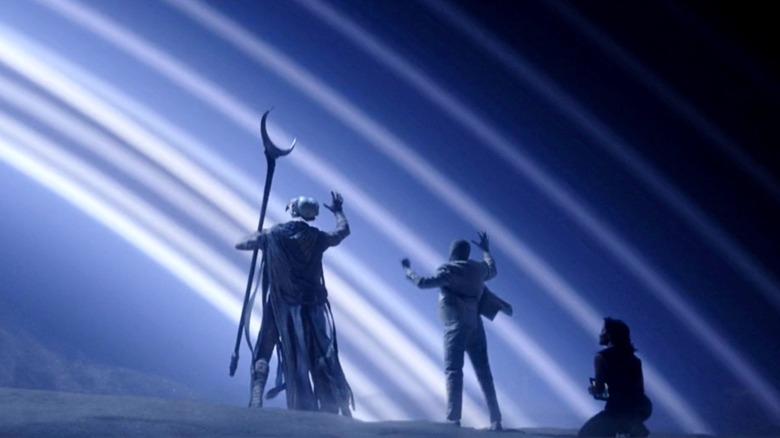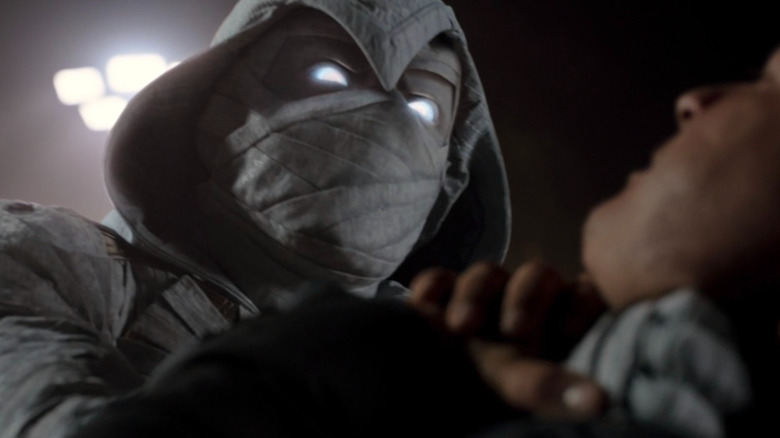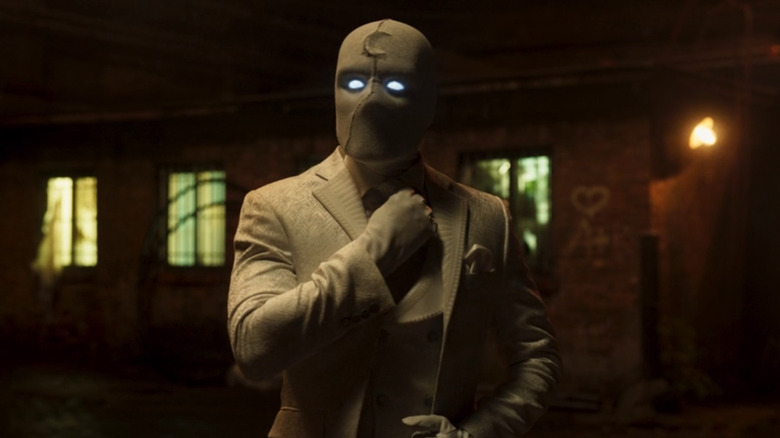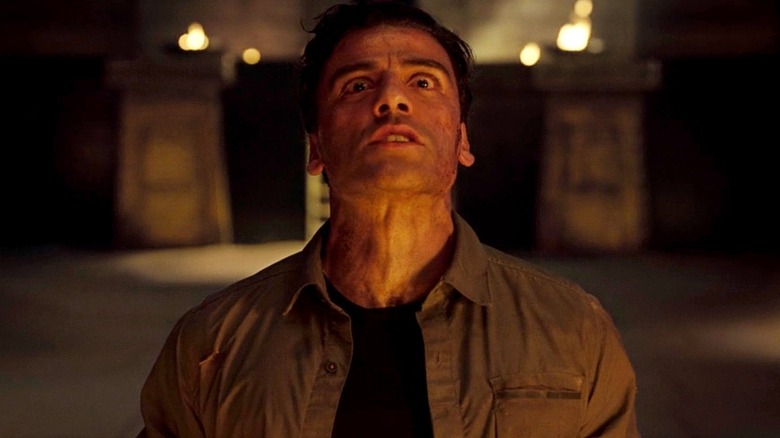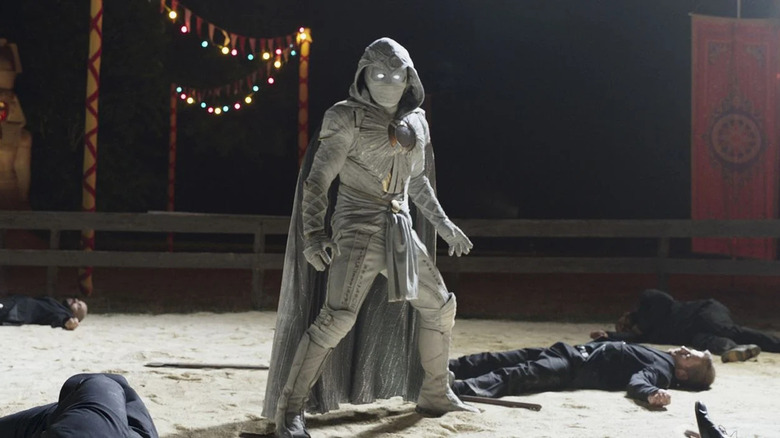Moon Knight Should Have Been A Movie
On the surface, one of the best things "Moon Knight" has going for it is its standalone nature in relation to the rest of the Marvel Cinematic Universe.
As of this writing, we're three episodes into "Moon Knight" — halfway through the six-episode series, which stars Oscar Isaac as its titular superhero — and thus far, the show seems content to inhabit its own quirky corner of the MCU. That's a refreshing change of pace for Marvel and the superhero movie and TV genre as a whole. Yet it's also something of a double-edged sword for Isaac's pell-mell character, insofar as he doesn't have the benefit of being established in the movies first, like every other Marvel series lead on Disney+ has until now.
The long-form nature of episodic streaming television gives Moon Knight's story more room to breathe, but it has also led to an oddly paced first adventure that, at times, feels almost suffocating in its insularity. By insularity, I don't mean lack of interconnectivity; I mean esoteric, borderline nonsensical bits that require reading an explainer to figure out what the heck is happening.
With talented actors, neat production design, and music by Hesham Nazih that doesn't feel generic the way some Marvel scores have, "Moon Knight" has plenty of good things going for it. Egyptian director Mohamed Diab has brought valuable insight and authenticity to the series, while indie directors Justin Benson and Aaron Moorhead have brought their unique grab bag of influences. Isaac's co-stars, May Calamawy and the late Gaspard Ulliel, both light up the screen.
However, the show's baroque plot is best experienced when you can fully immerse yourself into it, and stretching it out from week to week has left some memory gaps to fill. You could make the argument that this is a feature and not a bug, since it effectively leaves the viewer in the same place as the protagonist. But as we get to know Moon Knight, a hero with dissociative identity disorder who doesn't even know himself, I can't help but think that he both deserved and would have been better served by his own movie, rather than a TV show.
A 'self-possessed' hero
By now, Oscar Isaac has more than enough star power to carry a solo film — having starred in both critically-acclaimed movies like the Coen brothers' "Inside Llewyn Davis" and blockbusters like the "Star Wars" sequel trilogy. In the comics, Moon Knight has at least as much prominence and history as characters like Captain Marvel and the Guardians of the Galaxy, who enjoyed their live-action debuts on the big screen.
Yet for whatever reason (there are many possible reasons), Moon Knight's first live-action adventure is unfolding on Disney+, the way street-level heroes like Daredevil and the Punisher once found their adventures confined to Netflix after crashing and burning on the big screen during the early wave of subpar comic book movies in the 2000s.
Ethan Hawke's villain, Arthur Harrow, whose character motivations seem to be the same as those of the Precrime cops in Steven Spielberg's "Minority Report," points out that the hero of "Moon Knight" is "a man who literally does not know his own name." Said hero has at least two civilian identities (Marc Spector and Steven Grant) and two super-powered identities (Moon Knight and Mr. Knight). The third episode of his show may have also introduced a third personality, which means we're averaging one personality per episode, even as "Moon Knight" itself shifts genres with each episode.
Moon Knight gives new meaning to the idea of a "self-possessed" hero; at any given time, there are any number of selves that could be possessing him. When confronted with one of Knight's more stentorian selves, Harrow responds, "I must admit, I do not miss the sound of that voice." That's how I felt during the first episode when I realized "Moon Knight" was doing "Venom." It is full-on "Venom," with F. Murray Abraham's skull-beaked Khonshu taking the place of Tom Hardy's alien symbiote as our hero's dark passenger.
That's okay, though. "Venom" was commercially successful enough to warrant a sequel, "Let There Be Carnage," last year. Moviegoers got onboard for "Venom," and TV viewers seem to like "Moon Knight." But do they like his costume, and would it look any better with a movie budget?
Summon a better suit (for the opulence of the Overvoid)
In a Twitter thread earlier this month, showrunner Jeremy Slater revealed the backstory behind Moon Knight's costume. He contrasted it with "all the Stark/nanotech suits that currently populate the MCU," saying that it was inspired by Alex Ross's comic book artwork for the "Universe X" version of Moon Knight. The idea, according to Slater, is that the costume is "conjured into existence like the bandages on a mummy."
That's a very cool idea, but the way it's executed in "Moon Knight" leaves our CG mummy hero looking like an all-white Spawn who just slithered out of the uncanny valley. The better costume goes to Mr. Knight, perhaps because he's a man dressed in a reasonable facsimile of real clothes. However, the more traditional Moon Knight garb did have the potential to be far more impressive, either through blockbuster budget VFX or the kind of practical costume work that makes Mr. Knight's suit look so dandy.
A protracted fetch quest
I don't mean to be so critical, but "Moon Knight" is an action-adventure yarn. Though it may feature elements of drama, the show has a fetch-quest quality to it, complete with a golden scarab MacGuffin pointing the way to the tomb of a god with genocidal intentions. This kind of story doesn't necessarily sustain itself well when broken up by trips back to the real world, as the adventure takes a week-long break after every 45 minutes.
Marvel is one of the only movie studios that has been able to make it through the pandemic with a guaranteed audience for its theatrical releases. Up to this point, every MCU series on Disney+ has centered on a character or characters with existing movie ties. "WandaVision," "The Falcon and the Winter Soldier," "Loki," and "Hawkeye" were all extensions of the "Avengers" and "Captain America" films. They were each, in their own way, an epilogue to the Infinity Saga. Even "What If...?" featured the voices of established actors reprising their roles in alternate-reality scenarios.
Marvel has built its brand in Hollywood as a trendsetting purveyor of the shared-universe conceit. In Phase 4, the MCU has been moving in the multiverse direction so that movies that once existed separately, like the Tobey Maguire and Andrew Garfield "Spider-Man" films, could be said to inhabit the MCM, or Marvel Cinematic Multiverse. Meanwhile, certain lesser MCU films, such as "Thor: The Dark World," have little appeal beyond their connection to the wider franchise. Be honest: would you have ever rewatched "The Dark World" if it wasn't part of the continuing Marvel saga? As many have observed, the MCU already was a kind of TV show even before it pivoted to the small screen.
I'm not saying that "Moon Knight" should have shoehorned in a bunch of cameos and connections to other MCU films — far from it. But with this series, Marvel faces the challenge of introducing us to an all-new hero and his world in fits and starts over a period of six weeks, rather than in the kind of grand big-screen debut that characters like Loki enjoyed. Right now, "Moon Knight" feels more like a one-and-done flick with a slightly off-brand hero, like Edward Norton's Hulk.
Lost in the sea of Peak TV
In "Moon Knight," Steven Grant/Marc Spector has frequent blackouts and wakes up not knowing what happened or how he landed in his present surroundings. Speaking as a casual viewer who has watched "Moon Knight" in a relative vacuum without much post-episode discussion or supplemental online homework (i.e. going down a rabbit hole on a Marvel wiki or what-have-you), that's what it feels like tuning into the show every week. Yes, there's a little recap at the beginning to help refresh the viewer's memory, but if "Moon Knight" were a two-hour movie that could be experienced all in one sitting, it might ameliorate the uphill battle to get reinvested in the show, re-upping one's suspension of disbelief at its sky-stirring plot shenanigans every week.
Incidentally, I call myself a "casual viewer," but it hasn't always been that way for me with the MCU. As someone who grew up reading Marvel Comics and obsessive-compulsively organizing his collection in long boxes (I was there for Stephen Platt's Moon Knight, among other things), I will freely admit that I have been suffering some Marvel fatigue of late. Blame it on age or blame it on "Morbius," the latest Marvel movie, starring Jared Leto as a vampire superhero who somehow manages to be more soul-sucking than blood-sucking. Maybe Morbius is a stealth energy vampire?
It's possible this may have simply left me too drained to meet "Moon Knight" on its own wavelength. It's fun to see Mr. Knight roll up his sleeves and box with jackals, but as a viewer adrift in a sea of streaming content during the Peak TV age, I've found myself struggling to engage with "Moon Knight" overall, to the point where it's become something of a light, intermittently pleasurable chore to tick off my to-do list every Wednesday (or thereabouts). I don't know if it's just one of those shows that would ultimately be better served by binge-watching all six episodes at once. If that's the case, "Moon Knight" doesn't seem that different from a six-hour movie, and I'm of the mind that most six-hour movies could probably be distilled into even better two-hour short films.
"Moon Knight" episodes 1-3 are now available on Disney+. Episode 4 is set to release on Wednesday April 20, 2022.
